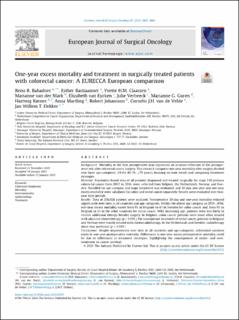| dc.contributor.author | Bahadoer, Renu R. | |
| dc.contributor.author | Bastiaannet, Esther | |
| dc.contributor.author | Claassen, Yvette H.M. | |
| dc.contributor.author | van der Mark, Marianne | |
| dc.contributor.author | van Eycken, Elizabeth | |
| dc.contributor.author | Verbeeck, Julie | |
| dc.contributor.author | Guren, Marianne | |
| dc.contributor.author | Kørner, Hartwig | |
| dc.contributor.author | Martling, Anna | |
| dc.contributor.author | Johansson, Robert | |
| dc.contributor.author | van de Velde, Cornelis J.H. | |
| dc.contributor.author | Dekker, Jan Willem T. | |
| dc.date.accessioned | 2021-08-10T07:58:49Z | |
| dc.date.available | 2021-08-10T07:58:49Z | |
| dc.date.created | 2021-04-30T14:08:33Z | |
| dc.date.issued | 2021 | |
| dc.identifier.issn | 0748-7983 | |
| dc.identifier.uri | https://hdl.handle.net/11250/2767118 | |
| dc.description.abstract | Background
Mortality in the first postoperative year represents an accurate reflection of the perioperative risk after colorectal cancer surgery. This research compares one-year mortality after surgery divided into three age-categories (18-64, 65-74, ≥75 years), focusing on time trends and comparing treatment strategies.
Material
Population-based data of all patients diagnosed and treated surgically for stage I-III primary colorectal cancer from 2007 to 2016, were collected from Belgium, the Netherlands, Norway, and Sweden. Stratified for age-category and stage, treatment was evaluated, and 30-day, one-year and one-year excess mortality were calculated for colon and rectal cancer separately. Results were evaluated over two-year time periods.
Results
Data of 206,024 patients were analysed. Postoperative 30-day and one-year mortality reduced significantly over time in all countries and age-categories. Within the oldest age category, in 2015–2016, one-year excess mortality varied from 9% in Belgium to 4% in Sweden for colon cancer and, from 9% in Belgium to 3% in the other countries for rectal cancer. With increasing age, patients were less likely to receive additional therapy besides surgery. In Belgium, colon cancer patients were more often treated with adjuvant chemotherapy (p < 0.001). For neoadjuvant treatment of rectal cancer, patients in Belgium and Norway were mostly treated with chemoradiotherapy. In the Netherlands and Sweden, radiotherapy alone was preferred (p < 0.001).
Conclusions
Despite improvement over time in all countries and age-categories, substantial variation exists in one-year postoperative mortality. Differences in one-year excess postoperative mortality could be due to differences in treatment strategies, highlighting the consequences of under- and over-treatment on cancer survival. | en_US |
| dc.language.iso | eng | en_US |
| dc.publisher | Elsevier | en_US |
| dc.rights | Navngivelse 4.0 Internasjonal | * |
| dc.rights.uri | http://creativecommons.org/licenses/by/4.0/deed.no | * |
| dc.title | One-year excess mortality and treatment in surgically treated patients with colorectal cancer: A EURECCA European comparison | en_US |
| dc.type | Journal article | en_US |
| dc.type | Peer reviewed | en_US |
| dc.description.version | publishedVersion | en_US |
| dc.rights.holder | Copyright 2021 The Authors | en_US |
| cristin.ispublished | true | |
| cristin.fulltext | original | |
| cristin.qualitycode | 1 | |
| dc.identifier.doi | 10.1016/j.ejso.2021.01.011 | |
| dc.identifier.cristin | 1907478 | |
| dc.source.journal | European Journal of Surgical Oncology | en_US |
| dc.source.pagenumber | 1651-1660 | en_US |
| dc.identifier.citation | European Journal of Surgical Oncology. 2021, 47 (7), 1651-1660. | en_US |
| dc.source.volume | 47 | en_US |
| dc.source.issue | 7 | en_US |

